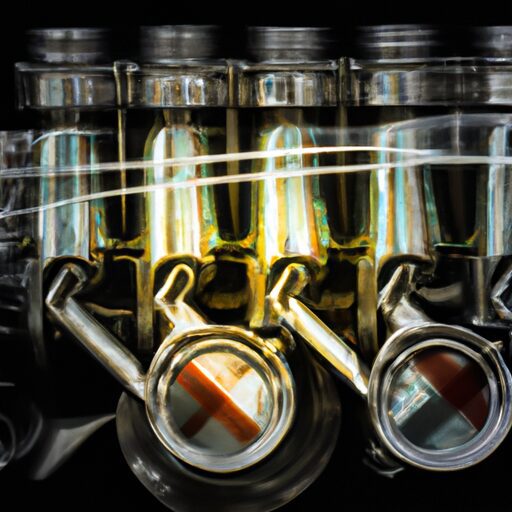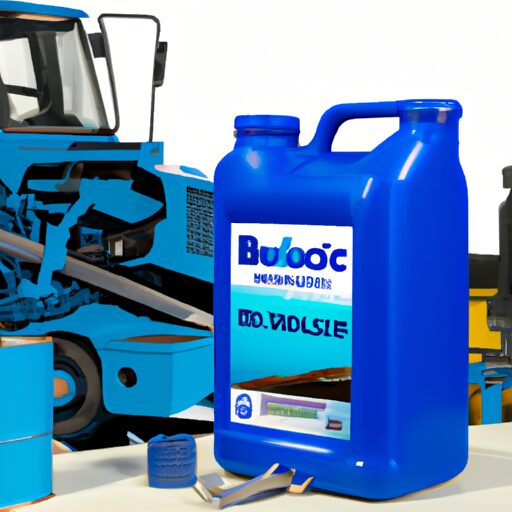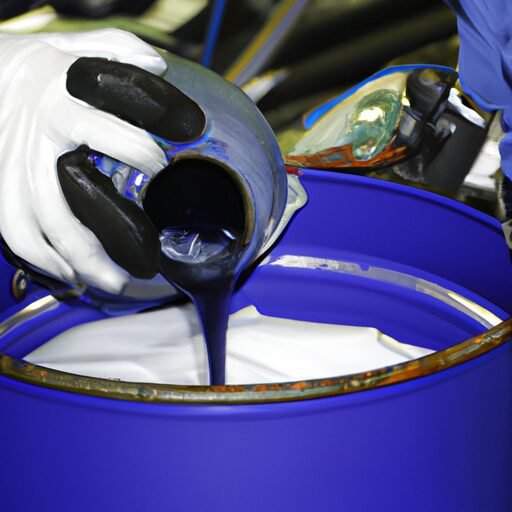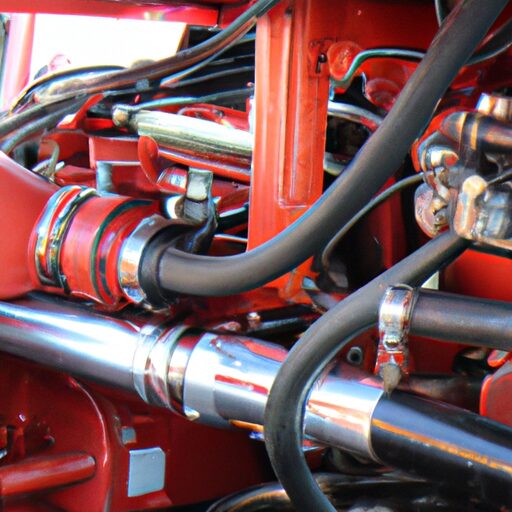Can You Use Gear Oil For Hydraulic Fluid
One might wonder whether gear oil can be used as a substitute for hydraulic fluid in various hydraulic systems. This article aims to address this question by examining the fundamental differences between gear oil and hydraulic fluid, their respective properties and functions, and the compatibility of gear oil with hydraulic systems. It explores the potential consequences of using gear oil in place of hydraulic fluid, provides recommended alternatives for optimal system performance, and offers best practices for maintaining and servicing hydraulic systems.
To understand the suitability of gear oil as a replacement for hydraulic fluid, it is crucial to comprehend the distinct characteristics of each lubricant type. Gear oil is specially formulated to lubricate gears and bearings that operate under high loads. On the other hand, hydraulic fluid serves multiple purposes such as transmitting power, lubricating moving parts, dissipating heat, sealing components, and preventing corrosion.
By exploring these aspects in detail, this article intends to provide valuable insights into the compatibility issues associated with using gear oil instead of hydraulic fluid.
Understanding the Differences Between Gear Oil and Hydraulic Fluid
Understanding the distinctions between gear oil and hydraulic fluid is essential in order to make informed decisions regarding their applications. Both gear oil and hydraulic fluid are lubricants used in machinery, but they have different properties and functions that make them suitable for specific purposes.
Hydraulic systems require regular maintenance to ensure optimal performance. Hydraulic fluids are specifically designed for these systems, providing proper lubrication and heat transfer capabilities. They have a low compressibility factor, allowing for efficient power transmission in hydraulic systems. Additionally, hydraulic fluids possess excellent anti-wear properties to protect system components from damage caused by friction and high-pressure conditions.
On the other hand, gear oil is primarily used in gearboxes or transmissions where there is a need for lubricating gears. It has higher viscosity compared to hydraulic fluids, which allows it to form a protective film on gear surfaces under extreme pressures. Gear oil also contains additives that provide enhanced protection against oxidation, rust, and foaming.
While both gear oil and hydraulic fluid serve as lubricants, their distinct compositions cater to different operational requirements. Understanding these differences enables engineers and maintenance personnel to select the appropriate lubricant based on the specific application needs of their machinery.
Transitioning into the subsequent section about "the properties and functions of gear oil," we will explore how this specialized lubricant further contributes to efficient machinery operations without compromising performance or durability.
The Properties and Functions of Gear Oil
One can compare the properties and functions of gear oil to an invisible shield that protects and lubricates the components within a mechanical system. Gear oil possesses several key properties that make it suitable for use in industrial applications.
Firstly, gear oil has excellent viscosity characteristics. This means that it maintains its optimal flowability across a wide range of operating temperatures. Choosing the right viscosity is crucial for ensuring proper lubrication and protection in different hydraulic systems.
Secondly, gear oil has high film strength. This property allows it to form a strong layer of lubrication between moving parts, reducing friction and wear. As a result, gear oil helps prolong the lifespan of gears, bearings, and other components.
Lastly, gear oil provides effective protection against rust and corrosion. It contains additives that inhibit oxidation and prevent the formation of harmful deposits on metal surfaces. This protective function is essential in industrial applications where equipment may be exposed to moisture or contaminants.
In summary, using gear oil in hydraulic systems offers several benefits such as optimal viscosity characteristics, high film strength for reduced friction and wear, and effective protection against rust and corrosion. Understanding these properties is crucial when selecting the appropriate gear oil for specific industrial applications.
Transitioning into the subsequent section about ‘the properties and functions of hydraulic fluid’, it is important to also consider how hydraulic fluids play a vital role in maintaining smooth operation within mechanical systems.
The Properties and Functions of Hydraulic Fluid
Hydraulic systems rely on the properties and functions of a specific fluid to ensure smooth operation, making it essential to understand its characteristics. One important characteristic of hydraulic fluid is viscosity, which refers to its resistance to flow. Understanding viscosity variations is crucial in selecting the appropriate fluid for a hydraulic system. The viscosity of hydraulic fluid affects its ability to lubricate moving parts and transmit power effectively.
Proper fluid selection is vital because using the wrong type of hydraulic fluid can lead to system failure. Hydraulic fluids are designed with specific additives and properties that enable them to withstand high pressures, temperatures, and shear forces. They also prevent corrosion, minimize wear and tear on components, provide sealing capabilities, and maintain optimal performance over extended periods.
Moreover, hydraulic fluids must have good thermal stability and low compressibility to ensure efficient operation under various conditions. They should also possess excellent air release properties as well as resistance against foaming.
In summary, understanding the properties and functions of hydraulic fluid is crucial in maintaining the longevity and efficiency of hydraulic systems. By selecting the suitable fluid based on factors such as viscosity variations and proper function requirements, operators can optimize their equipment’s performance while minimizing the risk of damage or malfunction. Transitioning into the subsequent section about "the compatibility of gear oil and hydraulic systems" highlights another critical aspect in ensuring proper functioning without compromising system integrity.
The Compatibility of Gear Oil and Hydraulic Systems
The compatibility between gear oil and hydraulic systems is a critical factor to consider in order to ensure smooth and efficient operation. Gear oil and hydraulic systems have different requirements in terms of lubrication, viscosity, and additives. Here are three key points to understand the compatibility issues:
-
Lubrication Requirements: Hydraulic systems require a fluid that provides both lubrication and power transmission capabilities. Gear oils, on the other hand, are primarily designed for providing lubrication to gear mechanisms. The different formulations of these fluids can result in inadequate lubrication or excessive wear if used interchangeably.
-
Viscosity Differences: Hydraulic systems require a specific viscosity range to function properly, as it affects the flow rate and efficiency of the system. Gear oils typically have higher viscosities compared to hydraulic fluids, which may lead to increased friction and reduced performance if used improperly.
-
Additive Considerations: Hydraulic fluids often contain specialized additives such as anti-wear agents, corrosion inhibitors, and foam suppressants to enhance their performance in hydraulic systems. These additives may not be present or suitable in gear oils, leading to potential consequences when used in hydraulic systems.
Understanding these compatibility issues is crucial for avoiding potential consequences of using gear oil in hydraulic systems without compromising their performance or causing damage.
Potential Consequences of Using Gear Oil in Hydraulic Systems
Using an incompatible lubricant in a hydraulic system can result in detrimental effects on its performance and potentially cause damage to the system. Gear oil, which is designed specifically for gearboxes and not hydraulic systems, may lead to several potential consequences when used as a substitute for hydraulic fluid.
One of the main issues with using gear oil in a hydraulic system is the difference in viscosity. Hydraulic systems require a specific level of viscosity to function properly, and gear oil may not meet these requirements. This can lead to poor lubrication, increased friction, and ultimately, system failure.
Furthermore, gear oil may contain additives that are not suitable for use in hydraulic systems. These additives can react negatively with the components of the hydraulic system, causing corrosion or degradation over time. Additionally, gear oil may lack certain additives that are necessary for proper functioning of the hydraulic system, such as anti-wear agents or rust inhibitors.
To illustrate these potential consequences visually:
| Potential Damage | System Failure |
|---|---|
| Increased friction leading to wear | Loss of pressure |
| Corrosion and degradation of components | Leakage |
| Inadequate lubrication | Malfunctioning valves |
In conclusion, using gear oil in a hydraulic system can result in potential damage and even system failure. It is important to use the recommended alternatives for hydraulic fluid to ensure optimal performance and longevity of the system.
Recommended Alternatives for Hydraulic Fluid
One viable option to ensure optimal performance and longevity of the system involves considering alternative fluids specifically formulated for hydraulic systems. These recommended hydraulic fluids offer several benefits over using gear oil in hydraulic systems. One major advantage is their ability to provide superior lubrication and wear protection, which helps prevent damage to system components such as pumps, valves, and cylinders. Additionally, these fluids have excellent thermal stability, allowing them to maintain consistent viscosity and performance even under high temperatures. This is crucial for maintaining efficient operation and preventing overheating in hydraulic systems.
Another benefit of using recommended hydraulic fluid is its compatibility with the various seals and materials commonly found in hydraulic systems. Unlike gear oil, which may cause swelling or deterioration of seals over time, these specialized fluids are designed to be compatible with elastomer materials commonly used in seals. This ensures proper sealing integrity and prevents leaks that can lead to reduced system efficiency or component failure.
In conclusion, utilizing alternative fluids specifically formulated for hydraulic systems offers several advantages over using gear oil. These include superior lubrication properties, improved thermal stability, and compatibility with system seals and materials. By choosing the appropriate hydraulic fluid for a specific application, users can optimize the performance and reliability of their hydraulic systems while minimizing the risk of damage or inefficiency caused by using unsuitable lubricants. Moving forward into best practices for maintaining and servicing hydraulic systems…
Best Practices for Maintaining and Servicing Hydraulic Systems
Implementing proper maintenance and servicing techniques is essential for ensuring the longevity and optimal performance of hydraulic systems, which can ultimately result in increased productivity and cost-effectiveness. To effectively maintain hydraulic systems and equipment, it is important to follow best practices that can minimize downtime and maximize efficiency. Here are three key recommendations:
-
Regular Inspection: Conduct routine inspections to identify any signs of wear or damage, such as leaks or abnormal noises. This helps catch potential issues early on before they escalate into major problems.
-
Fluid Analysis: Regularly analyze the hydraulic fluid to monitor its condition and detect any contaminants or degradation. This ensures that the fluid maintains its optimal viscosity and cleanliness levels, which are crucial for proper system operation.
-
Proper Fluid Replacement: Follow manufacturer guidelines for fluid replacement intervals and use only recommended fluids with the appropriate specifications. Using the wrong type of fluid can lead to reduced performance, premature component failure, or even catastrophic system damage.
By adhering to these best practices, you can effectively maintain hydraulic systems and equipment, minimizing downtime, reducing repair costs, and maximizing productivity in various industrial applications.
Frequently Asked Questions
Can I use gear oil as a substitute for hydraulic fluid in my hydraulic system?
Gear oil cannot be used as a substitute for hydraulic fluid in a hydraulic system. Hydraulic fluid properties, such as viscosity, differ significantly from gear oil, making it unsuitable and potentially damaging to the system’s performance and longevity.
What are the main differences between gear oil and hydraulic fluid?
Gear oil and hydraulic fluid have distinct properties. Gear oil is designed for high pressure, slow speed applications, while hydraulic fluid is formulated for lower pressure, higher speed systems. Their viscosity, additives, and thermal stability also differ, making them unsuitable substitutes.
Are there any potential risks or consequences of using gear oil in a hydraulic system?
Using gear oil in a hydraulic system can lead to potential risks and consequences. Compatibility issues may arise, affecting lubrication efficiency and resulting in performance degradation of the system.
Can using gear oil instead of hydraulic fluid damage the components of my hydraulic system?
Using gear oil instead of hydraulic fluid in a hydraulic system can potentially cause damage to the components due to compatibility issues. It is important to use the appropriate fluid to ensure optimal performance and prevent potential damage.
Are there any recommended alternatives to gear oil for hydraulic systems?
Recommended alternative fluids for hydraulic systems include synthetic hydraulic fluids, water-based hydraulic fluids, and biodegradable hydraulic fluids. Each has its own pros and cons in terms of performance, environmental impact, and compatibility with system components.
Conclusion
In conclusion, it is crucial to understand the distinctions between gear oil and hydraulic fluid in order to make informed decisions regarding their usage. Gear oil possesses specific properties and functions that cater to the requirements of gear systems, while hydraulic fluid is tailored for optimal performance in hydraulic systems. Attempting to substitute gear oil for hydraulic fluid can potentially lead to detrimental consequences, compromising the efficiency and longevity of the system. It is advisable to adhere to recommended alternatives for hydraulic fluid and follow best practices for proper maintenance and servicing of hydraulic systems.






